On the road with Obama
Rob Reynolds follows the US president on his first European trip as leader.

Rob Reynolds, Al Jazeera’s senior Washington correspondent, will be keeping a regular diary of Barack Obama’s first trip to Europe as US president. Obama is to begin his tour by attending the G20 summit in London before heading to France, Germany, the Czech Republic, Turkey and, in a surprise last minute trip, Iraq.
| 1600 GMT, Tuesday April 07, 2009, Istanbul: A surprise visit |
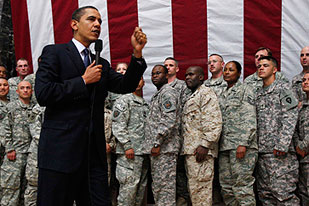 |
| Obama’s visit was to Iraq was mainly to support US troops there, aides said [Reuters] |
Obama left Istanbul early on Tuesday afternoon local time and flew directly to Baghdad, the capital of Iraq, in an unannounced, but widely rumoured, trip.
A small press contingent accompanied the president, reporting that Air Force One landed at Baghdad International airport in the afternoon local time.
Robert Gibbs, the White House press secretary told reporters that the choice of Iraq rather than Afghanistan was made for three reasons – firstly its proximity to Turkey and secondly the need to consult with Iraqi officials because efforts at progress there “lie in political solutions”.
Finally, he said it was about US troops – equally deserving of Obama’s attention and appreciation no matter where they serve.
Obama had planned to fly by helicopter to visit Nouri al-Maliki, the Iraqi prime minister and Jalal Talabani, the Iraqi president, but weather prevented him from doing so.
Instead he will speak with both officials by telephone, in addition to meeting General Ray Odierno, the top US military commander in Iraq, at the US military base Camp Victory and also troops stationed there.
He apparently will also participate in awarding of 10 medals of valour before leaving for Washington DC.
| 1500 GMT, Tuesday April 07, 2009, Istanbul: A consistent theme |
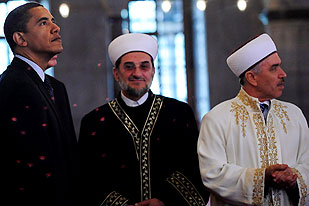 |
| Obama visited Istanbul’s historic Blue Mosque with several religious leaders [EPA] |
Istanbul is a beautiful city. Every time I have been here I’ve enjoyed its vibrancy and its incredible architecture, excellent food and warm people.
Obama himself had a relatively relaxed schedule here on the final day of his first major overseas tour.
In the morning he met religious leaders, toured several historic sites, and had a town hall meeting with Turkish college students – a format in which he is most comfortable and relaxed.
Over the course of eight days, visiting five countries and travelling thousands of kilometers, Obama struck a consistent theme:
“I came to put forward our ideas, but I also came to listen, not to lecture, ” he said on day one at a joint news conference with Gordon Brown, the UK prime minister.
“The US came here to listen, learn and lead,” he said at the Nato summit in Strasbourg.
“We must listen to each other and seek common ground,” he also told the Turkish national assembly in Ankara.
‘Common interests’
Partnership, common interests, dialogue and respect – it is certainly a pronounced change from the days of George Bush when US acted unilaterally and with a degree of arrogance that soured public opinion, spoiling the US image abroad.
On Obama’s trip, foreign leaders fell all over themselves trying to be Obama’s best buddy.
“I want to thank you for your leadership, your vision, and your courage,” Brown gushed.
“I trust him, his word, his intelligence,” declared Nicolas Sarkozy, the French president.
European public response was just as warm as that of their leaders. Czechs turned out by the tens of thousands to hear Obama speak about nuclear non-proliferation; French women screamed and tried to give him kisses and a Turkish pastry shop created a new sweet known as “Barak-la-va”.
Obama often found himself playing mediator in chief with his newly-aquired circle of admirers.
He brokered a deal between France and China over tax havens, helped sort out a squabble over the new Nato chief and encouraged dialogue between long-time foes Turkey and Armenia.
Mission ‘accomplished’?
 |
| Obama returns to a country gripped by economic turmoil [AFP] |
White House officials say they have accomplished everything they had hoped for on the trip.
But they did not get everything they wanted.
In London, Obama and the G20 leaders agreed on strict new financial regulations, but he was unable to convince them to enact big, new stimulus spending packages.
At a summit in France, Nato leaders endorsed his strategy in Afghanistan but refused to provide many new troops to carry it out.
Turkey was the last and in some ways the most interesting stop on Obama’s tour.
Problems at home
Here he extended his theme of finding common ground, frequently invoking Turkey’s hybrid identity as a secular, moderate Muslim state and bridge between Europe and the Middle East.
“This is not where East and West divide,” he said in his parliament speech, “it is where they come together”.
He made another pitch for improved relations with the Muslim world, saying: “We will be respectful, even when we do not agree. And we will convey our deep appreciation for the Islamic faith, which has done so much over so many centuries to shape the world for the better – including my own country.”
Now, Obama is returning to his own country where a pile of problems await, including job losses, an economy in recession and stiff opposition to his ambitious domestic agenda.
| 1700 GMT, Monday April 06, 2009, Ankara: Mending fences |
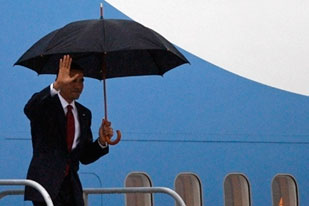 |
| The Turkey trip is Obama’s first visit as president to a predominantly Muslim country [Reuters] |
Barack Obama told Turkey’s national assembly on Monday that he wants a fresh start in relations with the Muslim world.
“I know that the trust that binds us has been strained, and I know that strain is shared in many places where the Muslim faith is practiced,” Obama said.
“Let me say this as clearly as I can: The United States is not at war with Islam and never will be.”
He also urged Turkey to renew its efforts to broker talks between Syria and Israel – talks that were broken off during Israel’s war on Gaza.
Obama reminded Israel it must stand by previously made agreements, after Avigdor Lieberman, the new Israeli foreign minister, appeared to repudiate the Annapolis accords.
“Both Israelis and Palestinians must take the steps that are necessary to build confidence”, Obama said.
“Both must live up to the commitments they have made, including Annapolis. Both must overcome longstanding passions and the politics of the moment to make progress toward a secure and lasting peace.”
Paying tribute
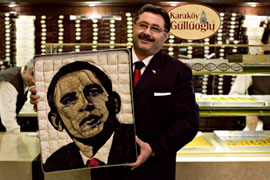 |
| Obama has a surprisingly high opinion poll rating in Turkey [Reuters] |
This is Obama’s first visit as president to a predominantly Muslim country and the final country on his five-nation overseas tour.
He began the day with a wreath-laying ceremony at the massive, yellow stone mausoleum of the Turkish Republic’s founder, Mustafa Kemal Ataturk.
Obama’s visit here was meant to restore a US-Turkey relationship he believes have been adrift in recent years.
Around three-quarters of all Turks have a low opinion of the US but, surprisingly, half have a favourable opinion of Obama.
After visiting the memorial site, Obama and Abdullah Gul, the Turkish president, had a 90-minute meeting and spoke to reporters afterward.
On the spot
At one point a reporter put Obama on the spot – with a question whether the US should recognise the World War I killing of up to 1.5 million Armenians under the Ottoman Empire as an act of genocide.
As a member of the US senate, Obama supported a congressional resolution declaring the killings to be genocide.
He said he still does, but praised Turkey for improved relations with Armenia.
And with that potentially thorny issue dealt with – and after receiving a standing ovation from the Turkish parliament – Obama headed to his final stop on this whirlwind trip, the historic city of Istanbul.
| 1200 GMT, Sunday April 05, 2009, Prague: Words ‘meaning something’ |
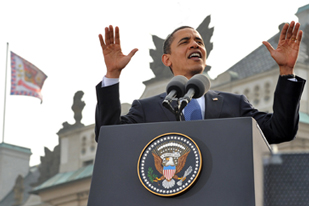 |
| Obama announced a plan to secure vulnerable nuclear material around the world within four years [AFP] |
Nearing the end of a five-nation tour of Europe and Turkey, Barack Obama, the US president, chose the majestic setting of Prague’s ancient Hradcany Castle for his most significant policy speech of the trip.
The location – in a former Warsaw bloc capital, long the scene of Cold War intrigue and tragedy – was a carefully selected one.
Evoking the fear of nuclear annihilation that shadowed the lives of Europeans and Americans for generations, Obama outlined his plan to drastically reduce, or even eliminate, the threat of nuclear attack.
“As the only nuclear power to have used a nuclear weapon,” Obama declared, “the United States has a moral responsibility to act. So today, I state clearly and with conviction America’s commitment to seek the peace and security of a world without nuclear weapons.
“To put an end to Cold War thinking, we will reduce the role of nuclear weapons in our national security strategy and urge others to do the same.”
He said he would push the US congress to ratify the Comprehensive Test Ban Treaty, negotiated in 1996 but still without enough signatories to be put into force.
Arms control
Obama called for greater international co-operation and for more authority to be given to nuclear inspectors. He said North Korea “broke the rules” with Sunday’s rocket launch, which occurred just hours before he spoke.
“Rules must be binding. Violations must be punished,” Obama intoned. “Words must mean something”.
But he never mentioned the one Middle East country with an undisclosed nuclear stockpile: Israel.
Obama is re-starting arms-control talks with Russia – a project long neglected under George Bush, the former US president.
Obama also called for an extensive new international effort to find and secure all unguarded nuclear material, citing the danger of al-Qaeda getting hold of a bomb. On the subject of so-called loose nukes, he announced a new international effort “to secure all vulnerable nuclear material around the world within four years”.
Using somewhat conciliatory language, Obama offered an incentive and a warning to Iran. “We will support Iran’s right to peaceful nuclear energy with rigorous inspections,” he said.
“That is a path that the Islamic republic can take, or the government can choose increased isolation, international pressure, and a potential nuclear arms race in the region.”
Obama said the US ballistic missile shield, due to be set up here in the Czech Republic and in Poland, might become unnecessary if Iran shows it does not seek a nuclear weapon.
Warm welcome
Obama was warmly received in Prague. A crowd of approximately 20,000 turned out to listen to the speech and there was no evidence of the violent mass street protests that marred previous stops in England France and Germany.
His final stops on the tour are in Ankara and Istanbul. He will speak before the Turkish National Assembly in the capital and hold a high-tech, interactive town hall-type forum in the ancient city on the Bosphorus.
Obama will have to tiptoe carefully around, or through, an issue of keen interest to his Turkish host: the Armenian Genocide question.
As a presidential candidate, he supported a congressional resolution officially recognising the killing of as many as 1.5m Armenians by the Ottoman empire in the first world war as genocide.
Congress is trying again to pass the measure. Turkey has refused for over 90 years to recognise this awful chapter in its past.
Will Obama appear wishy-washy on such a sober subject to avoid offending the Turks? Or will he stand up to his assertion, as he said in his speech today in Prague, that “words must mean something”.
While White House officials say the Turkey trip will not include Obama’s highly anticipated speech addressing relations between the Islam and the West, it will certainly be closely watched for substance, nuance – and possible missteps – throughout the Muslim world.
| 2300 GMT, Saturday April 04, 2009, Prague: Easing tensions |
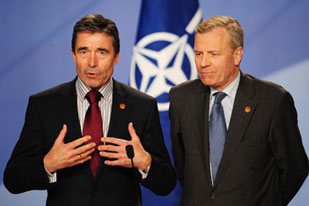 |
| Rasmussen, left, has coveted the job as Nato’s next secretary-general [AFP] |
We have moved on to Prague now, the lovely, mellow old city on the banks of the Vlatava. Here, Barack Obama, the US president, is scheduled to make what a senior White House official describes as a “major speech” on nuclear nonproliferation and arms control.
Earlier, Obama was, by White House accounts, instrumental in working out a deal that allowed Nato to nominate Anders Rasmussen, the Danish prime minister, as secretary-general.
It was the resolution of an embarrassing family quarrel that marred Nato’s 60th birthday party.
Jaap de Hoop Scheffer, the alliance’s current secretary-general, is due to see his term expire this summer. Rasmussen, backed by Angela Merkel, Germany’s chancellor, coveted the job, but Turkey, one of Nato’s two predominantly Muslim country, objected.
That’s because several years ago Rasmussen defended the right of a Danish newspaper to publish inflammatory cartoons that many Muslims felt insulted the Prophet Muhammad.
The flap over the cartoons led to nasty protests, violence, and plenty of ill will between many devout Muslims and the West.
Turkish objections
Perhaps more important for Tayyip Recip Erdogan, the Turkish prime minister, was his desire for Denmark to shut down a Copenhagen radio station affiliated with the the separatist Kurdistan Workers’ Party, or PKK.
As the Nato summit got underway, Obama asked to meet Abdullah Gul, the Turkish president, and Rasmussen together.
White House officials won’t say whether there was a quid pro quo deal reached, but the three emerged all smiles and Turkey dropped its objection to the Dane.
The negotiation with Obama, officials say, included a discussion of Turkey’s concerns with regard to “terrorism” – code for the PKK.
Berlusconi’s phone call
Earlier, in an awkward moment carried live on television Silvio Berlusconi, the Italian prime minister, had a long conversation with Erdogan on his cell phone, delaying the Nato summit’s elaborate opening ceremony.
As minutes went by, Merkel seemed annoyed by Berlusconi’s behaviour and eventually she led the group in a “symbolic” (and hokey) crossing of a footbridge over the Rhine, meant to commemorate good relations between old enemies France and Germany. Berlusconi didn’t make the walk – he was still on the phone.
With the family squabble sorted out Nato leaders addressed more substantive issues – endorsing Obama’s new comprehensive Afghanistan strategy, which focuses on dismantling al-Qaeda.
Obama said the strategy got Nato’s received the “stamp of approval”, but with a measly contribution of new European troops to help implement it. Approximately 5,000 soldiers and police trainers will be provided, but only on a temporary basis, till Afghan elections in August are done.
While the leaders parlayed in a meeting hall in Strasbourg, demonstrators went on a tear through the old city, smashing windows and setting fires. Tear gas wafted through the streets.
Hopefully the more violent protesters are all tuckered out now and will give the EU summit in Prague a miss.
It’s getting late here and we will have another early call tomorrow, with a full day of live reports ahead. But maybe there’s time to have a glass or two of that tasty Czech beer.
| 2200 GMT, Friday April 03, 2009, Strasbourg: A ‘peachy’ reception |
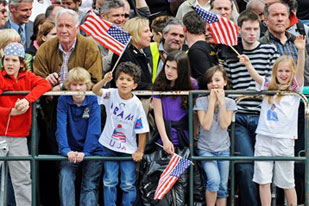 |
| Crowds awaited the Obamas in Germany [AFP] |
Barack Obama’s first close encounter with the European public on this tour was very close indeed, as several giggling young Frenchwomen tried to place kisses on the presidential cheek as he greeted a crowd outside the historic Palais Rohan in Strasbourg.
As a journalist, I take a sceptical view of all sorts of Obamamania, even Euro-Obamamania.
But as an American, accustomed as I became over the past eight years to the apparent scorn and derision of some Europeans toward the administration of George Bush, Obama’s predecessor, I must say it’s a refreshing change.
After a review of some extremely fancily-dressed soldiers, Nicholas Sarkozy, the French president, and Obama retired for a private meeting.
French troops concern
At the press conference afterwards, Sarkozy and his guest showered each other with compliments.
“I trust him,” the French leader said of Obama, adding, perhaps in a slight dig at Bush, “I trust his intelligence.”
Obama told reporters in turn: “I’m confident that when the United States and France are acting in concert, that the prospects for peace and prosperity around the world are strengthened.”
But the “love-fest” would only go so far. Sarkozy said “non” to new French troops for Afghanistan.
“There will be no extra troops, French troops,” he declared, “because the decision to step up our troop presence was taken already last year.
“We are prepared to do more in terms of police, of the gendarmes, the military police, in terms of economic aid, in order to train Afghans and ‘Afghanise’ Afghanistan.”
Obama seemed content not to press the issue, knowing that European political realities make new troop commitments nearly impossible.
Rapturous reception
 |
| Obama seemed content not to press the issue of French troops in Afghanistan [AFP] |
Sarkozy did commit to helping Obama deal with the dilemma of Guantanamo Bay detainees whom Washington believes still pose a risk, but cannot send home to their own countries because they might be tortured or executed.
There were demonstrations on the streets of Strasbourg, and some violent clashes, but a dense “cordon sanitaire” of French police kept the protestors well away from the leaders who are gathering for Nato’s 60th birthday party.
At a US-style town hall meeting full of mostly younger Europeans, the Obamas got yet another rapturous reception.
The crowd screamed when Obama ventured a little French, saying “Good afternoon, Bonne apres-midi!”
His serious message: The US and Europe must stand together.
“Together, we must forge common solutions to our common problems,’ he said.
“America is changing, but it cannot be America alone that changes. We are confronting the greatest economic crisis since World War II. The only way to confront this unprecedented crisis is through unprecedented co-ordination.”
German visit
But there was some playful banter, too, when a young woman from Heidelberg named Ennis Otto confided: “I wanted to tell you that your name in Hungarian means ‘peach’.”
Obama seemed to be in his element with the crowd – relaxed, casual, taking questions on a variety of subjects. He had them practically eating out of his hand.
Later Obama crossed the Rhine river to visit Angela Merkel, the German chancellor, and to plead for the public’s patience to allow his Afghanistan strategy time to succeed.
On Saturday Obama and other Nato members will grapple with difficult questions, including Afghanistan and relations with Russia, as his European tour continues.
But for the moment, Obama’s reception has been, well, peachy – in just about any language.
|
2100 GMT, Thursday April 02, 2009, London: Rising powers |
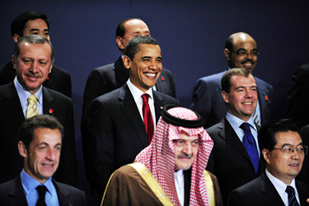 |
| Obama got the chance to rub shoulders with some of the world’s most powerful leaders [AFP] |
Barack Obama, the US president, maintained on Thursday that the US is still a critical actor on the world stage.
“I do not buy into the notion that America cannot lead, but with the world as complex as it is, it’s important for us to form partnerships and not dictate,” he said, following his meeting with world leaders.
But many here at the G20 believe the US, while still the world’s pre-eminent economic power, has experienced a downgrade.
That’s not only because Wall Street played with matches and set the global economic house on fire.
The turbocharged, risk-addicted and consumer-centric model of US capitalism is broken for good.
Obama acknowledged as much when he said that “we must put an end to bubble bust cycle that endangers prosperity”.
But the US role in the global economic meltdown had left resentment in some quarters at the G20 towards Washington.
And while there was support from Obama and Gordon Brown, the British prime minister, for better global financial regulation, there was a feeling from the two leaders that it could be a case of closing the stable door after the horse has bolted.
China on the march
On an another level, there is a palpable sense of the geopolitical forces shifting and cracking.
The so-called “Global South”, long taken for granted, has now taken a place at the table.
And what we saw from world leaders is a feeling that other emerging powers such as Russia, India and Brazil now deserve a bigger say in world institutions such as the IMF.
“It’s a recognition we are in same boat, [that the] voices of emerging economies [are] being heard,” said Abhisit Vejjajiva, the Thai prime minister.
Perhaps the most significant recent development is the march of China, the world’s third largest economy, to the forefront of the international financial system.
“This summit signals a shift from China being a moderate player to asserting a more proactive international role, some may say a leadership role,” says Gregory Chin from the Centre for International Governance, a Canada-based policy group.
“The Chinese are careful about leadership, but I think we’re seeing China moving towards a more active foreign policy agenda.”
Next, Obama goes to the Nato summit in France to round up allied support for his next huge international challenge – the war in Afghanistan.
| 1700 GMT, Wednesday April 01, 2009, London: On the defensive? |
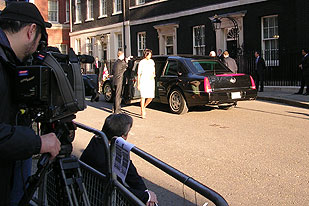 |
| Obama’s talks at Downing St with the UK leader are the first of many such meetings [Al Jazeera] |
With fault lines emerging on the eve of the G20 summit, Barack Obama, the US president, met Gordon Brown, the British prime minister, in a show of unity.
“I have come here to listen, not to lecture,” Obama said, as Brown declared: “We are within a few hours, I think, of agreeing a global plan for economic recovery and reform.”
Obama denied any significant rifts and said that global leaders have found common ground on many issues, saying “the separation between the various parties involved has been vastly overstated.”
But real differences on key issues remain.
Placing blame
Obama had wanted participating countries – representing 85 per cent of global economic output – to commit to massive new government stimulus spending.
But opposition from Nicolas Sarkozy, the French president, and Angela Merkel, the German chancellor, appears to have scuttled those plans.
France and Germany want the G20 to impose much stricter international controls on banks, hedge funds, executive pay and offshore tax havens.
Sarkozy has even threatened to walk out of the summit if his demands for tougher rules go unmet.
So as crowds of angry anti-G20 protesters filled London streets, Obama was on the defensive – questioned about how US-style hyper-capitalism triggered financial meltdown and worldwide recession.
“Some are to blame but all are responsible,” the president said at his news conference, adding: “I am less interested in identifying blame than fixing the problem.”
US-Russia ‘progress’
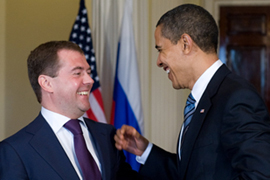 |
| Obama plans to visit Russia in July for talks [AFP] |
Obama’s meeting with Brown was just one of a series of high level talks he has been holding ahead of Thursday’s extraordinary summit.
The president is also adding to his travel schedule.
He agreed with Dmitri Medvedev, the Russian president, to negotiate a new treaty on nuclear arms before December and accepted an invitation to visit Moscow in July.
“What we’re seeing today is the beginning of new progress in US-Russian relations,” Obama said during his “one on one” with the Russian president.
After talks with Hu Jintao, the Chinese president the White House announced Obama will also journey to China later this year.
There will be hard bargaining ahead at London’s Excel Centre, the venue for the G20 conference.
But first, there was a memorable moment for the US president at Buckingham Palace.
That was where he ended his day – a remarkable scene, as Barack Obama, the son and grandson of British colonial subjects in Kenya, met his fellow head of state – Britain’s Queen Elizabeth II.
| 1800 GMT, Tuesday March 31, 2009, London: A significant summit |
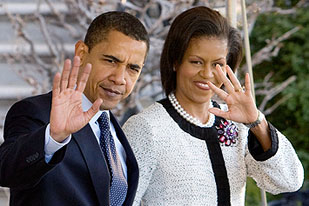 |
| Smiles aside, can Obama achieve consensus on combating the global financial crisis? [Reuters] |
The weather in London is typically English – grey and damp with a hint of rain.
The meteorological conditions match the expectations going into this week’s G20 summit meeting, to be held in a gleaming new dockside convention centre.
Just days before the summit, there is no clear outline of a plan by the worlds largest economies to pull the world out of the global recession.
Barack Obama, the US president now on his first major trip abroad, will face leaders who have rejected his call for a big co-ordinated global stimulus plan.
No ‘apology’ plans
He may also face demands for an apology – a concept already being floated by some European intellectuals – for the US role in the financial meltdown.
|
Follow Al Jazeera’s correspondents on Twitter at the G20 summit:
|
I believe an apology is unlikely, although Obama will certainly acknowledge that ghastly mistakes were made in pursuit of the US model of capitalism, with its manic disregard for risk and obsessive pursuit of profits.
But any hint of grovelling before the Europeans, Chinese and others would be political poison back in the US.
Obama is still, despite missteps and misgivings over the past two months or so, quite popular in the US – but that approval could dissipate rapidly if he seems over-matched or unsure of himself at the G20.
And I think Obama’s continued support is more an act of faith by Americans than a hard headed analysis of the prospects for his programmes to succeed in the near term.
Fortunately for Obama, his fellow heads of state and government convening in London this week are less politically strong than he.
Leadership challenges
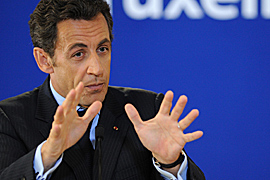 |
| Will Sarkozy challenge Obama to impose stricter financial regulation? [AFP] |
Their inclination seems to be to bolster their own status by seeking to bask in some of the US president’s reflected glow.
But there is also the prospect that one leader or other – France’s Nicolas Sarkozy perhaps? China’s Hu Jintao? – will challenge US leadership openly, in a bid to reset the balance of political power in the world.
France and Germany want to impose a strict new international regulatory framework for global finance, with a much lager role for governments.
Some call this the end of capitalism as we know it.
New model?
Perhaps a new model is emerging. Certainly the US cannot escape some diminishing of its stature now, after the long dismal years of the Bush presidency, when its heedless Madoffs and AIGs smashed the prosperity dreams of the world’s billions.
Usually, global gatherings of this sort are ephemeral events, with lots of fine words and no results – witness the Annapolis conference on the Middle East in 2007 for example.
But this summit is truly significant, because if it fails – if there is open disagreement and disarray – the consequences could be disastrous.
In the absence of a global agreement, each nation may seek to export its economic pain abroad through protectionism, setting off a ruinous cycle of “beggar-thy-neighbour” trade policies.
Someone, either individually or collectively, needs to show leadership.
And, at this stage, it is still Obama who is the likeliest to seize the moment. Let us hope someone does.
